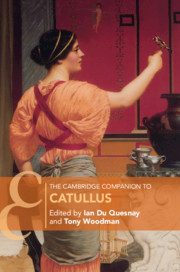Book contents
- The Cambridge Companion to Catullus
- The Cambridge Companion to Catullus
- Copyright page
- Contents
- Notes on Contributors
- Preface
- Introduction
- Chapter 1 Situating Catullus
- Chapter 2 Literary Liaisons
- Chapter 3 Catullan Intertextuality
- Chapter 4 Gender and Sexuality
- Chapter 5 Catullan Themes
- Chapter 6 Language and Style
- Chapter 7 Catullus and Metre
- Chapter 8 Catulli Carmina
- Chapter 9 Catullus and Augustan Poetry
- Chapter 10 Rewriting Catullus in the Flavian Age
- Chapter 11 The Manuscripts and Transmission of the Text
- Chapter 12 Editions and Commentaries
- Chapter 13 Catullus in the Renaissance
- Chapter 14 Catullus and Poetry in English since 1750
- Abbreviations and Bibliography
- Index Locorum
- General Index
Chapter 6 - Language and Style
Published online by Cambridge University Press: 09 April 2021
- The Cambridge Companion to Catullus
- The Cambridge Companion to Catullus
- Copyright page
- Contents
- Notes on Contributors
- Preface
- Introduction
- Chapter 1 Situating Catullus
- Chapter 2 Literary Liaisons
- Chapter 3 Catullan Intertextuality
- Chapter 4 Gender and Sexuality
- Chapter 5 Catullan Themes
- Chapter 6 Language and Style
- Chapter 7 Catullus and Metre
- Chapter 8 Catulli Carmina
- Chapter 9 Catullus and Augustan Poetry
- Chapter 10 Rewriting Catullus in the Flavian Age
- Chapter 11 The Manuscripts and Transmission of the Text
- Chapter 12 Editions and Commentaries
- Chapter 13 Catullus in the Renaissance
- Chapter 14 Catullus and Poetry in English since 1750
- Abbreviations and Bibliography
- Index Locorum
- General Index
Summary
The collection of poems which the Italian Renaissance handed down to us under the title Catulli Veronensis liber documents an unprecedented revolution in the Latin poetic landscape. Catullus redefined the parameters of acceptable subject matter, ideological stance, and poetic persona; he accomplished that transformation through an exceptional ability to engage with inherited traditions of literary and colloquial language. Catullus was capable of refashioning the terminology of traditional Latin values, and of elevating traits of Latin usage that poets had previously rejected as inappropriate or discarded as outdated. He was the exquisite translator of Sappho and Callimachus, the ingenious recycler of Plautus and Ennius, the skilful epigrammatist capable of juxtaposing Hellenistic innovations, Latin conversational and inscriptional formulae, and his own personal elaboration of the language of the street. In so doing Catullus created a poetic diction that defies generic classifications and projects a distinctly subjective authorial voice.
- Type
- Chapter
- Information
- The Cambridge Companion to Catullus , pp. 116 - 142Publisher: Cambridge University PressPrint publication year: 2021
- 1
- Cited by

